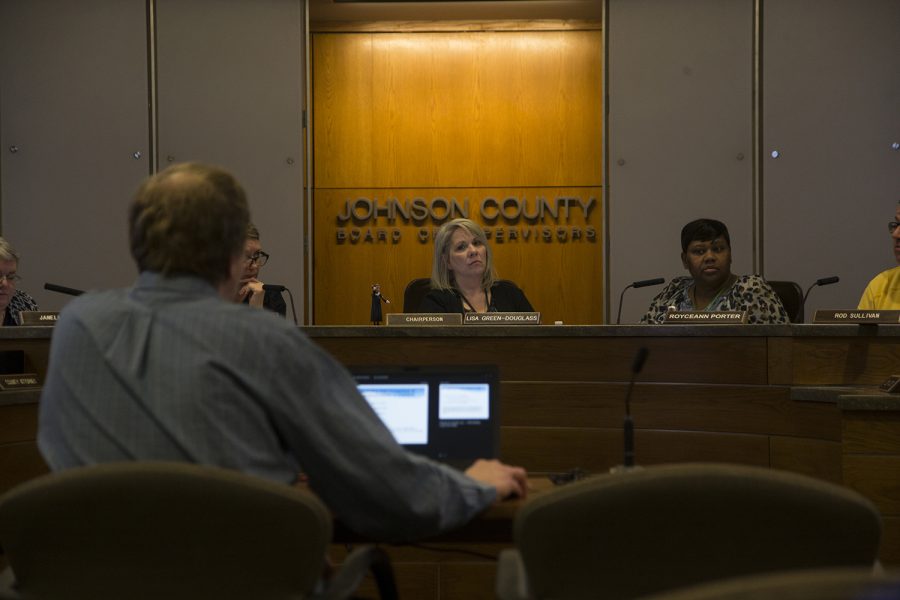Johnson County Board of Supervisors hope businesses choose to honor their $10.75 minimum wage recommendation
The board recommends, but does not mandate, a minimum wage for business owners. This year, they suggest raising it to $10.75
The Johnson County Board of Supervisors is seen at a public forum for the 2020 fiscal year budget at the Johnson County Administration Building on Wednesday February 27 2019.
July 13, 2021
The Johnson County Board of Supervisors is making efforts to raise the standards of living in the county by recommending an increase to the minimum wage, a recommendation that went into effect this month, as they have done every year since 2015.
The board is recommending $10.75, a 12-cent increase from the previous year.
After the first state minimum wage increase recommendation passed, former Gov. Terry Branstad signed House File 295 in 2017, which limits any municipality or county enforcement of minimum wage ordinances, meaning that any change to the minimum wage is allowed, but it cannot be enforced.
Since 2015, the Johnson County Board of Supervisors have recommended increases to the minimum wage. In 2015 it was $8.20; $9 in 2016; $10.10 in 2017; $10.63 in 2020; and most recently, $10.75 as of this March. This year’s recommendation went into effect starting July 1.
“Even though it is voluntary and not enforceable, we are grateful to the many area businesses who honor the recommended wage,” Chair of the Board of Supervisors Pat Heiden said.
In recent years, a national minimum wage increase has been a heavily-discussed topic, with President Joe Biden’s endorsement of the idea. The Biden-Harris administration signed an Executive Order to raise the minimum wage to $15 for federal workers.
The main argument against raising the minimum wage is that it will damage the businesses and thus the economy. However, Kelli Andresen, communications coordinator for the Board of Supervisors, cited a 2015 Iowa Policy Project study, which shows a different result.
“The report indicated that [raising the minimum wage] enhanced the life of those folks who are working at that wage, and it did not actually impede on businesses,” Andresen said. “So, every indication from that study was that this is good for everybody.”
RELATED: Johnson County now named after the first Black woman to earn a Ph.D from UI, Lulu Merle Johnson
Andresen explained that based on the study, increasing wages did not damage the businesses.
“You have to remember that every increase in pay that a person gets ends up helping the economy, in some way,” Andresen said, “… because if there’s an increase in wages, there’s an increase in spending, and those dollars go back into the local economy, more often than not.”
The Board of Supervisors believes the increase to minimum wage will improve the lives of residents of Johnson County. According to the Iowa Policy Project, if the minimum wage is raised to $12, it would benefit at least 413,000 Iowan workers.
“We are committed to decreasing poverty by striving to pay a ‘living wage’ in Johnson County and to raise the standard of living of the low wage workers. This not only benefits the workforce but also our communities and County,” Heiden said.
The board cannot mandate an increase of minimum wage because of Branstad’s 2017 bill, so any increase in pay for minimum wage workers is in the hands of the employer.
“But it’s as simple as employers deciding to raise the wage,” Andresen said. “Again, it’s not a mandate, it’s a recommendation. But it’s up to each individual employer to choose whether or not they want to pay their employees that amount of money. So, the board would appreciate it if they did.”
The Center for Worker Justice of Eastern Iowa, an organization committed to helping the low wage workers of Eastern Iowa, published on their website that over 175 businesses in the county that have already committed to paying employees the $10.10 minimum wage.
The center’s executive director Mazahir Salih, who is also an Iowa City city councilor, remembers $5.25 was the minimum wage in 1999 when she arrived in the United States.
“This is over 22 years ago, when minimum wage has been increased two dollars only,” Salih said.
When Salih first arrived in the country, she landed in Virginia. She said she remembers her rent being really high and she was only making minimum wage.
Salih said she knows first-hand that a minimum wage salary isn’t enough to live on, and believes the county is doing a good job by increasing the recommended minimum wage.
“We have a lot of people in Iowa today really suffering,” Salih said. “$7.25 is not enough.”
Back when the county first increased the recommended minimum wage in 2017, Salih remembers that there were no businesses harshly affected by the increase.
She said by raising the minimum wage, businesses would see more traffic, and people will eat and shop more locally.
“Of course, of course, the economy will grow,” Salih said.
Both Salih and Andresen said a growing economy will only benefit from an increase of minimum wage.
“You have to remember that every increase in pay that a person gets ends up helping the local economy in some way, because if there’s an increase in wages, there’s an increase in spending, and those dollars go back into the local economy more often than not,” Andresen said. “And so, the businesses did not see a downfall. Actually, the employees saw benefit.”



